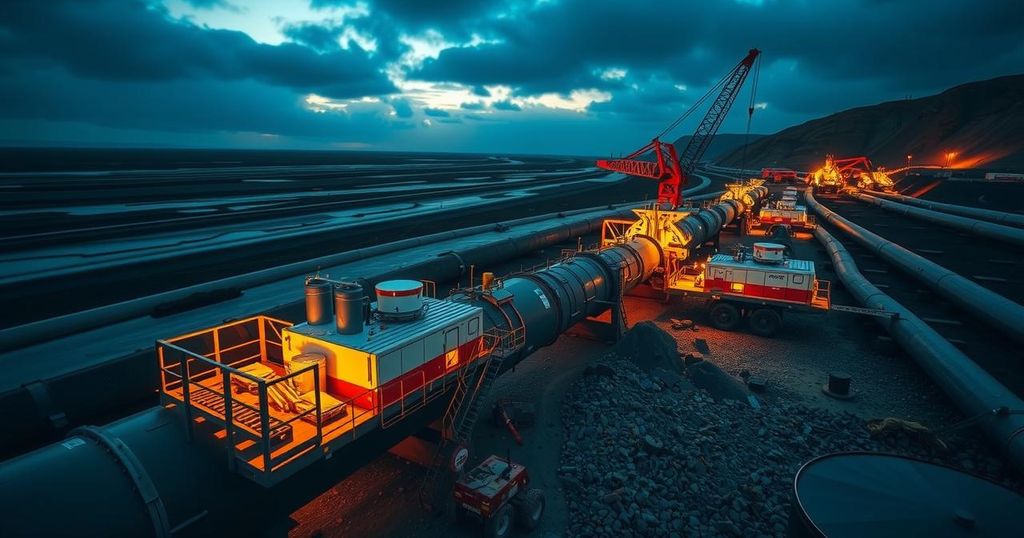The East African Crude Oil Pipeline (Eacop) has achieved 47% completion as of September 2024. It is a joint venture between the Tanzanian and Ugandan governments and major stakeholders TotalEnergies and CNOOC. The pipeline project is set to cost $3.5 billion, with significant local benefits in terms of compensation and employment. Completion is expected by July 2026, with ongoing community engagement.
As of September 2024, the East African Crude Oil Pipeline (Eacop) Project, a key infrastructure endeavor linking Uganda to Tanzania, has achieved a completion rate of 47%. Commenced in February 2022, the project is a joint venture involving the Tanzanian and Ugandan governments, each holding a 15% equity stake. TotalEnergies, as the primary shareholder, possesses 62% of the venture, while China National Offshore Oil Corporation (CNOOC) controls the remaining 8%. Presently, implementation of pipe-laying operations spans across eight distinct regions, demonstrating substantial advancement in the construction timeline. The total expenditure associated with the Eacop project is projected at $3.5 billion. This substantial investment demands meticulous logistical and environmental strategies to alleviate potential adverse effects on local ecosystems and communities. Mr. Asiadi Mrutu, the project coordinator from the Tanzania Petroleum Development Corporation (TPDC), has confirmed that construction activities are adhering to the projected schedule with completion expected in July 2026. In their latest assessment, it was reported that 9,868 individuals, or 99.3% of those eligible for compensation, have received payments totaling Sh35.1 billion. Moreover, the project has generated significant job opportunities, with 8,694 Tanzanians securing temporary and permanent employment since its initiation. The economic benefits extend beyond employment; the project has facilitated government revenue through permits, fees, and taxes on land. Procurement of local services for the project has reached a value of Sh82.1 billion, further fortifying local economies. Mr. Mrutu highlighted the collaborative efforts between local residents and regional governments in safeguarding the pipeline infrastructure, reinforcing the community’s role in protecting the project from potential sabotage. Upon the project’s completion, 148 workers from both Uganda and Tanzania are projected to attain permanent employment positions. Furthermore, Mr. Mrutu emphasized the importance of stakeholder engagement, noting, “We have invited stakeholders to participate in meetings, seminars, and discussions on important project issues. This ensures that their opinions are considered in the project’s implementation.”
The East African Crude Oil Pipeline (Eacop) represents a significant infrastructural advancement in East Africa’s oil transportation capabilities. Spanning approximately 1,443 km, this pipeline is intended to transport crude oil from oil fields in Uganda to the port of Tanga in Tanzania, facilitating oil exports and tapping into global markets. The project is critically important not only for the economies of Uganda and Tanzania but also for regional energy security and economic growth. Given the magnitude of investment and environmental considerations, it requires careful planning and community involvement throughout its lifecycle.
In summary, the Eacop project is progressing in line with its schedule, having reached a significant 47% completion as of September 2024. It has generated substantial economic and employment benefits for local communities while ensuring adherence to rigorous environmental and logistical standards. The collaboration among stakeholders and the commitment to community engagement are integral to the ongoing success and sustainability of this major infrastructure initiative. With a projected completion date in July 2026, Eacop holds promise for transforming the economic landscape of East Africa, ensuring broader access to oil markets.
Original Source: www.thecitizen.co.tz






